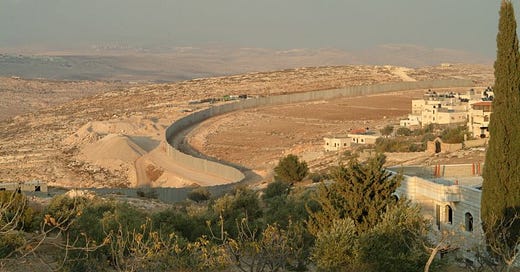Shared Solutions: A Spotlight on Sciences Po Students’ Work with EcoPeace Middle East
By Maia Zasler, Sciences Po—Menton
Crises make the news. Conflict developments, violence, and provocative governmental declarations unfolding in the Middle East fill social media feeds; they propel a particular narrative of evolving tensions and humanitarian upheaval. Although reporting on such stories is undeniably important, they often overshadow undercurrent issues of equally concerning, detrimental predicaments. The ongoing climate crisis acutely affects the Middle East, the most water scarce region on the planet. Environmental challenges tend to exacerbate existing geopolitical conflicts; EcoPeace Middle East, an international NGO based in Amman, Ramallah, and Tel Aviv, views the climate-related obstacles as avenues of possible collaboration.
EcoPeace acknowledges the need for climate-based solutions across the Levant and Middle East. Founded by Jordanian, Palestinian, and Israeli academics in 1994, EcoPeace envisions a future of cooperation, of shared resources and climate policies that transcend borders and generate a pathway to achieving lasting peace in the region.
The last few months have been especially challenging; this fifth Gaza war has marked a period of immense loss and destruction. It has also seemingly pushed the prospect of a political peace settlement further out of the picture. But those at EcoPeace remain hopeful; their conception of the region may be idealistic, but if implemented, would have incredibly positive, profound ripple effects. They are innovative, revolutionary in the preservation of the integrity of their proposed solution. Despite involving political coalition and cooperation, it prevails as purely scientific.
Students at Sciences Po, the Menton campus, have had the opportunity to work closely with certain members of the EcoPeace team. The GRC team leaders report a distinct enthusiasm among consultants; the passion is palpable. Each consultant shares in EcoPeace’s belief, and this element has kept engagement high and motivation reinforced.
The Project
Our consultants are focused on a “Partnership Optimization Strategy.” They work to deepen relationships between EcoPeace and outside organizations, striving to share operational efforts and amplify EcoPeace’s message.
The consultants have divided up the work into three categories aligning with EcoPeace’s various involvements: Climate advocacy, environmental peace building, and transboundary water cooperation. Across each category, consultants analyze each of the partnerships within, addressing how each partnership truly benefits EcoPeace. After a response has been sufficiently ascertained, the consultants create an action plan: how these partnerships can be strengthened, helping EcoPeace realize their own goals and foster a dual production of dependency.
For example, under the climate advocacy groups, consultants have identified EcoPeace’s affiliation with the United Nations Framework Convention on Climate Change (UNFCCC) as expressly important. The UNFCCC’s specific initiative, Water for Climate Pavilion, in COP conferences is water-centric, concerned with water security. Consultants have advised that EcoPeace assume a more active role in the initiative, publishing blogs, resources, etc. as many other organizations do on the Water for Climate Pavilion website. Additionally, consultants have recommended that EcoPeace apply for accreditation through UNFCCC, allowing them to participate in COP conferences, commenting on resolutions and potentially giving speeches.
Consultants will structure their performance metrics based on the furthering of EcoPeace’s primary causes. This is admittedly difficult; long-term success must be accounted for, and since it is not necessarily financed-based, sustained achievements are inherently ambiguous.
GRC team leaders reference EcoPeace’s primary initiative, the Green Blue Deal, in their long-term thinking and in formation of their desired impact and implementation of deliverables. The Green Blue Deal tackles regional water scarcity and prioritizes a movement away from non-renewable resources. It insists upon tripartied cooperation. Jordan has the space and the capacity to institute renewable e
nergy (e.g., wing and solar power). This green energy can be shared with Palestine and Israel. Both Palestine and Israel can create water desalination plants, which could then be transported to Jordan. This conception is thus the nexus between water and energy.
Through the assurance of effective and meaningful partnerships with outside organizations, our consultants aim to amplify EcoPeace’s reach and to facilitate the realization of their mission in the most efficient and practical way possible.
Relevance
Water-energy exchanges between Jordan, Palestine, and Israel are not only beneficial to their respective economic and environmental conditions, but are integral steps to forging geopolitical cooperation and a sustainable future; a future that is sustainable in every sense of the word. Renewable freshwater resources are dwindling in the region, and, from a global perspective, are already relatively low.
Shared water management alleviates governmental and social burdens and cultivates a certain sense of community. Similar to the philosophy of the European Union, EcoPeace endeavors to establish layered economic and trade dependencies to enshrine cooperation. In this current climate of conflict, they function as a beacon of possibility. In recognition of their groundbreaking environmental peace-building work, they have received a joint nomination for a Nobel Peace Prize.
One of our consultants stated that it was “truly mind blowing” to assist in the efforts of the organization. They feel that they have played a part in helping EcoPeace further their goals and have thereby contributed to a broader, long-lasting piece of peace-building and climate improvements.






